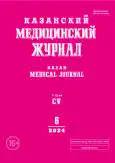Особенности гематологических индексов при катаракте в динамике хирургического лечения
- Авторы: Смирнова О.В.1, Зинкина Т.О.1
-
Учреждения:
- Научно-исследовательский институт медицинских проблем Севера
- Выпуск: Том 105, № 6 (2024)
- Страницы: 936-945
- Раздел: Теоретическая и клиническая медицина
- Статья получена: 12.03.2024
- Статья одобрена: 05.08.2024
- Статья опубликована: 18.11.2024
- URL: https://kazanmedjournal.ru/kazanmedj/article/view/628943
- DOI: https://doi.org/10.17816/KMJ628943
- ID: 628943
Цитировать
Аннотация
Актуальность. Катаракта — одно из наиболее распространённых офтальмологических заболеваний, приводящих к слепоте.
Цель. Изучение особенностей гематологических индексов у мужчин старше 40 лет при различных видах катаракты до и после хирургического лечения.
Материал и методы. В группы обследования были включены 25 пациентов (25 глаз) с локализацией помутнений в кортикальном веществе хрусталика, 19 (19 глаз) — с тотальными помутнениями, 26 (26 глаз) — с ядерными помутнениями, 30 (30 глаз) — с субкапсулярными помутнениями; из них 43 пациента (43 глаза) были с начальной катарактой, 39 (39 глаз) — с незрелой, 18 (18 глаз) — со зрелой. Группу контроля составили 30 человек. Всем участникам исследования выполняли полный офтальмологический осмотр и оценку гематологических показателей. По общепринятым формулам рассчитывали следующие интегральные гематологические показатели: лимфоцитарный индекс (лимфоциты/нейтрофилы); лейкоцитарный индекс интоксикации; индекс соотношения нейтрофилов и лимфоцитов; индекс соотношения нейтрофилов и моноцитов; индекс соотношения лимфоцитов и моноцитов; индекс соотношения лимфоцитов и эозинофилов; индекс соотношения лейкоцитов и скорости оседания эритроцитов. Статистический анализ проведён с использованием пакета Statistica 10. Для оценки различий в группах использовали непараметрические критерии Краскела–Уоллиса и Манна–Уитни. Критический уровень статистической значимости при проверке научных гипотез составлял р <0,05.
Результаты. При всех степенях зрелости катаракты до и после операции в гематологических индексах выявлены однонаправленные изменения показателей: уменьшен индекс соотношения лимфоцитов и эозинофилов (1,4–2,0; р=0,01), увеличены индексы соотношения нейтрофилов и моноцитов (1,3–2,1; р=0,04), лимфоцитов и моноцитов (1,4–2,5; р=0,02), лейкоцитов и скорости оседания эритроцитов (2,9–6,8; р=0,01). При незрелой катаракте показатель интоксикации по гематологическим индексам в динамике хирургического лечения увеличивается в 2 раза. При этом разнонаправленные изменения в гематологических индексах выявлены при кортикальном и субкапсулярном помутнении хрусталика, однонаправленные — при ядерном и тотальном помутнении.
Вывод. Больные ядерной и тотальной катарактой имеют наибольшее количество нарушений в соотношении популяций клеток по гематологическим индексам, поэтому составляют группу риска по развитию осложнений.
Ключевые слова
Полный текст
Об авторах
Ольга Валентиновна Смирнова
Научно-исследовательский институт медицинских проблем Севера
Email: ovsmirnova71@mail.ru
ORCID iD: 0000-0003-3992-9207
SPIN-код: 2198-0265
д-р мед. наук, проф., зав. лаб., лаб. клинической патофизиологии
Россия, г. КрасноярскТатьяна Олеговна Зинкина
Научно-исследовательский институт медицинских проблем Севера
Автор, ответственный за переписку.
Email: tatka-doktor@mail.ru
ORCID iD: 0009-0003-0587-4452
аспирант
Россия, г. КрасноярскСписок литературы
- Pascolini D., Mariotti S.P. Global estimates of visual impairment: 2010 // Br J Ophthalmol. 2012. Vol. 96, N. 5. P. 614–618. doi: 10.1136/bjophthalmol-2011-300539
- Исрафилова Г.З. «Важные игроки» в развитии возрастной катаракты (обзор литературы) // Офтальмология. 2019. Т. 16, № 1S. С. 21–26. doi: 10.18008/1816-5095-2019-1S-21-26
- Бикбов М.М., Гильманшин Т.Р., Якупова Э.М., и др. Основы эпидемиологии. Эпидемиология в офтальмологии (обзор литературы) // Современные проблемы здравоохранения и медицинской статистики. 2021. № 4. С. 364–387. doi: 10.24412/2312-2935-2021-4-364-387
- Чухраев А.М., Сахнов С.Н. Динамика и прогнозирование заболеваемости глаукомой и катарактой в крупных городах Краснодарского края // Проблемы социальной гигиены, здравоохранения и истории медицины. 2019. Т. 27, № 1. С. 28–30. doi: 10.32687/0869-866X-2019-27-1-28-30
- Kuthyar S., Anthony C.L., Fashina T., et al. World health organization high priority pathogens: Ophthalmic disease findings and vision health perspectives // Pathogens. 2021. Vol. 10, N. 4. P. 442. doi: 10.3390/pathogens10040442
- Borges G., Nock M.K., Haro Abad J.M., et al. Twelve-month prevalence of and risk factors for suicide attempts in the World Health Organization World Mental Health Surveys // J Clin Psychiatry. 2010. Vol. 71, N. 12. P. 1617–1628. doi: 10.4088/JCP.08m04967blu
- Каган И.И., Канюков В.Н. Функциональная и клиническая анатомия органа зрения. Руководство для офтальмологов и офтальмохирургов. Москва: ГЭОТАР-Медиа, 2017. 208 с.
- Wride M.A. Lens fibre cell differentiation and organelle loss: Many paths lead to clarity // Philos Trans R Soc Lond B Biol Sci. 2011. Vol. 366, N. 1568. P. 1219–1233. doi: 10.1002/cbf.1737
- Chang D., Zhang X., Rong S., et al. Serum antioxidative enzymes levels and oxidative stress products in age-related cataract patients // Oxid Med Cell Longev. 2013. Vol. 2013. P. 587826. doi: 10.1155/2013/587826
- Kumarasamy A., Jeyarajan S., Cheon J., et al. Peptide-induced formation of protein aggregates and amyloid fibrils in human and guinea pig αA-crystallins under physiological conditions of temperature and pH // Exp Eye Res. 2019. Vol. 179. P. 193–205. doi: 10.1016/j.exer.2018.11.016
- Королёва И.А., Егоров А.Е. Метаболизм хрусталика: особенности и пути коррекции // РМЖ. Клиническая офтальмология. 2015. Т. 15, № 4. С. 191–195. EDN: VOXFKV
- Ковалевская М.А., Щепетнева М.А., Филина Л.А. Клинико-биохимические исследования при различных формах осложнённой катаракты // Научно-медицинский вестник Центрального Черноземья. 2007. № 28. С. 15–20. EDN: LTWIWR
- Коваленко Л.А., Суходолова Г.Н. Интегральные гематологические индексы и иммунологические показатели при острых отравлениях у детей // Общая реаниматология. 2013. Т. 9, № 5. С. 24–28. doi: 10.15360/1813-9779-2013-5-24
Дополнительные файлы









